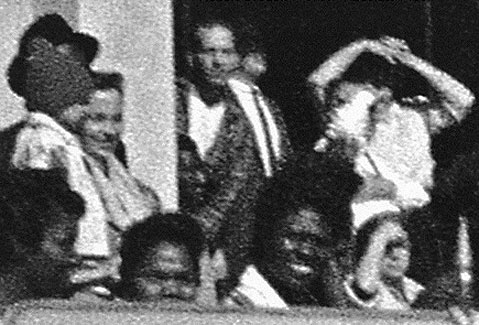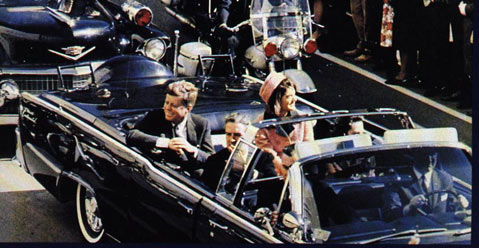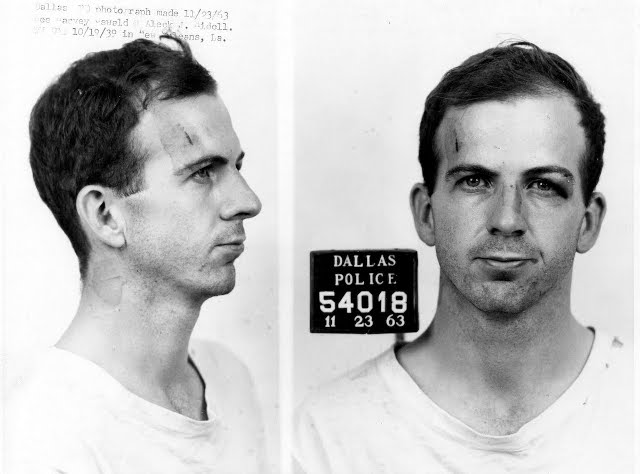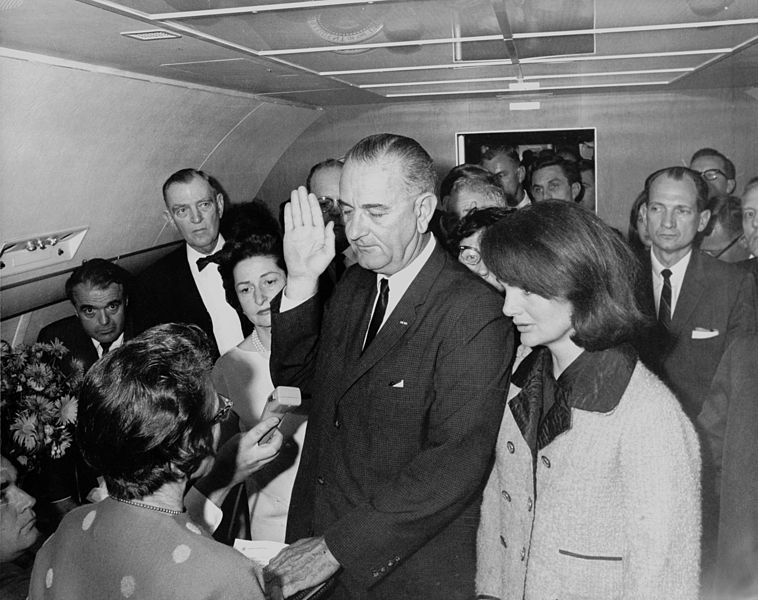
Even a so-called villain needs people in his corner, and they ask: Where was Oswald the day Kennedy died?
Etched as deeply into America’s psyche as the moment President John F. Kennedy was shot are the smoldering questions over how and why he was killed, and who was behind it. The official government report that puts a single sniper assassin who fired three shots — Lee Harvey Oswald — on the sixth floor of a book depository near the presidential motorcade has been mercilessly challenged for 50 years. And while fringe theories for the killing sway between plausible and absurd, the grainy footage and photographs of that sunny Friday afternoon in Dallas continue to be picked apart in books and movies and blogs.
One long-standing group — now around 150 members strong — maintains that Oswald could not have been the shooter, that he was in fact standing in the depository’s doorway as the motorcade passed. They point to an Associated Press photograph as indisputable proof that Oswald was not JFK’s lone killer but rather the fall guy in a nefarious and far-flung plan hatched by government spooks, military brass, Texas oil tycoons, mob hit men, and communist sympathizers to kill the president for their collective benefit.
The Oswald Innocence Campaign will hold a “truth event” at the Fess Parker Doubletree Hotel on November 22 to present its findings and counter what it calls the “official fabrications” perpetuated by the government and the media. After a day of talks, The Pacific Coast Blues Band will perform during drinks and dancing, including their new song “He Didn’t Do It.” The event is open to the public.
Campaign chairman Dr. Jim Fetzer spoke with The Santa Barbara Independent about the summit, who he thinks actually killed Kennedy and why, how there was indeed another shooter on the grassy knoll (plus five more snipers around the plaza), that the “magic bullet” theory is total baloney, and that anyone who looks at the evidence can’t help but question the official line. What follows is an edited version of our conversation.
Why did you choose Santa Barbara for your conference? Dallas is going to be locked down tighter than a drum. I think there was enormous apprehension that one million Americans might show up at Dealey Plaza and demand the truth about JFK. So they imposed severe constraints. They’re only allowing 5,000 individuals, and you actually have to submit your Social Security number and go through some kind of background review. If they have any reason to think you might be a protester, they’re not going to let you in.
We also had no reason to think anything new will be presented in Dallas. So we wanted a distinctive location, because what we are presenting is cutting-edge research. And because Jack and Jackie honeymooned in Santa Barbara, it seemed like a very appropriate locale.

What’s your mission? The Oswald Innocence Campaign is dedicated to achieving justice for an American citizen who appears to have been a committed patriot recruited by the office of Naval Intelligence in San Diego. He was thereafter stationed at Atsugi in Japan, one of our most secure bases. His defection to the Soviet Union was actually a mock defection, and when he returned to the United States he was welcomed by a CIA front organization. He was not treated as if he had been a traitor to the country, and he was given funds to relocate to New Orleans, where he worked with right wingers in the heart of the U.S. intelligence community. He was being sheep-dipped, as the expression has it—given a false persona as a pro-Castro communist sympathizer.
Then, a woman named Ruth Pane who was working for the CIA arranged for Oswald to obtain a job in the book depository just weeks before the assassination, which was part of the whole project to set him up as the patsy. In fact, the attorney general of Texas launched an investigation immediately after the assassination and discovered that Lee was working as an informant for the FBI and that he was being paid $200 a month right up to the time of the assassination, which may explain the absurd situation that the government of the United States denies that it can make public the IRS records of the man who was accused of assassinating our 35th president.
Oswald was part of the plot? I thought you said he was a patriot. He appears to have been on the fringe of the conspiracy, but it was beyond his control. Secret Service agent Abraham Bolden published a book about his experiences. He talks about how an [assassination] attempt on Kennedy planned for Chicago had been aborted because of information from an informant by the name of Lee, who appears to have been Oswald. So in his role working for the FBI, he was actually able to subvert some attempts.
It’s not clear to me how fully informed Oswald was about the events taking place in Dallas, but he wasn’t even on the sixth floor and can’t possibly have been a shooter. That’s one of the most important findings and rationales for the existence of the Oswald Innocence Campaign. We discovered evidence internal to a photograph taken by AP photographer James Altgens, but also external to it, including that Lee had told homicide detective Will Fritz that during the shooting he had been out with one of his supervisors, Bill Shelley, in front of the book depository. If you look at the height, weight, build, and the clothing he’s wearing—especially the highly unusual shirt and the t-shirt he has on—they correspond very closely to what Oswald was wearing when he was arrested.
So this is your smoking gun. There are so many smoking guns. In “Murder in Dealey Plaza,” I published three collections of studies by experts on different aspects of the case to parallel a critique of the Warren Commission, in which Bertrand Russell, one of the great philosophers of the 20th century, lays the question: Why was there no section of the Warren Commission report addressing the question of who killed Kennedy? There’s just so much that reveals this was a setup. The only way you can maintain a belief in the official account is if you are unfamiliar with the evidence.
How do you debunk the “magic bullet” theory? (Which says a single bullet hit Kennedy in the back then exited through his throat and injured Texas Governor John Connally.) If you go back and review the broadcast footage from the day of the assassination, you’ll find on NBC, for example, Chet Huntley and the other anchors are reporting two wounds. One was a small, clean puncture wound to the throat, which Malcolm Perry, the physician who performed a simple tracheotomy, described three times during the Parkland press conference that was held at the hospital after it was announced the president was dead. Malcolm Kilduff said it was a simple matter of a bullet right through the head while pointing to his right temple.
That wound to the right temple, which blew out the back of Kennedy’s head — it was a frangible, exploding bullet — sent out shock waves with such force that when [brain and skull matter] impacted motorcycle patrolman Bobby Hargis, riding to the left rear of the limousine, he thought he himself had been shot.
But when the reports about these two wounds are being widely disseminated on radio and television, and the story starts to trickle in that that the gunman was above and behind, NBC news journalist Frank McGee—who was nobody’s fool—says: This is incongruous. How can the man have been shot from in front from behind? And that established the basic problem confronting the Warren Commission.
Indeed, that day, both the FBI and the Secret Service concluded that there had been three shots with three hits, that JFK had also been hit in the back, five-and-a-half inches below the collar, just to the right of the spinal column. Connelly had been hit in the back by a second shot, and a third shot hit JFK at the lower back of his head.
A bystander named James Tague had been injured by a shot that missed, so the Warren Commission was confronted with a dilemma of either adding that there had been a fourth shot, or subtracting one from the hits and treating it as a miss, which is what they chose to do. That required that the shot to the back be transformed into a magic bullet that could perform feats that no actual bullet could have actually done. … A deconstruction of the magic bullet theory shows it is not only provably false, but is indeed anatomically impossible.
Now, the reason this is so terribly important is that even Michael Baden, MD, onetime medical examiner for the City of New York who was the head of the House Select Committees on Assassinations medical panel when it re-investigated the case in 1977-78, observed that if the magic bullet theory were false, then there had to be at least six shots from three different directions.
And he’s correct, because JFK was hit four different times. He was hit in the back, he was hit in the throat (that actually passed through the windshield), and then after the driver William Greer pulled the limousine to the left and to a halt, he was shot twice in the head. Then there was the shot that missed and hit Tague, that’s five. Then of course one or more shots to Connelly. So there had to be at least six shots if the magic bullet theory was false.

Does that mean you claim there were six different shooters? It’s interesting you raise that question, because there were shooters at six different locations, and there were a total of 8, 9, or 10 shots. Three shots missed.
The shot to Kennedy’s back was fired by a shooter on top of the county records building who appears to have been a Dallas Deputy Sheriff. He fired that shot using a .30-06 fitted with a plastic collar known as “sabot” by means of which you can fire a smaller caliber bullet. So he fired a Mannlicher Carcano bullet to implant it in JFK’s body to implicate this obscure WWII weapon Lee was alleged to have used. (Oswald could have bought a far superior weapon at any street corner in Dallas without even showing ID.)
The shot to the throat that passed through the windshield appears to have been fired from the south end of the triple underpass by an individual I believe to have been an Air Force expert by the name of Jack Lawrence, who had gone to work for the automobile dealership that provided the vehicles for the motorcade just a few days before the event. Afterwards, he showed up all muddied and vomiting and nauseated. He appears to have fired from or made his escape from a sewer opening in that vicinity of the south end.
Then the shot that hit JFK in the back of the head after the limousine was brought to a halt was fired from the Dal-Tex building which housed a uranium mining corporation that is a CIA front. Three shots were fired from that location, and I believe they were the only un-silenced shots. These appear to have fired by an anti-Castro Cuban by the name of Tony Escadero. The anti-Castro Cubans held JFK responsible for the failure of the Bay of Pigs invasion.
Another of the shooters who fired from the grassy knoll was a Dallas police officer in uniform. His name was Roscoe White and he was working for the CIA. He had the easiest shot, but he pulled it because it would have hit Jackie, so his shot went into the grass.
Then you had a shooter in the book depository, but on the Westside. That shooter appears to have been Malcolm “Mack” Wallace who was Lyndon Johnson’s personal hit man. Mack Wallace’s fingerprint was found on the boxes when they were arranged to make the impression of [Oswald’s] assassin’s lair [in the book depository.]
Finally, the individual who fired the shot that entered the right temple appears to have been Frank Sturgis, who worked for the CIA and had ties with the Meyer Lansky crime syndicate.
If it was these six men, what was their motivation? What you have is a representative of each of the different powerful groups that joined together in a conspiracy to take out the president of the United States. JFK had antagonized the most important special interest groups in the country at the time. He was disillusioned with the CIA and was threatening to shatter it into a thousand pieces.
He’d upset the joint chiefs because he had not gone ahead and invaded Cuba contrary to their unanimous recommendation. He had signed an above-ground test ban treaty with the Soviet Union despite their unanimous opposition. And then he had started pulling our forces out of Vietnam where the chiefs believed a stand had to be taken against international, godless communism.
Then he had instructed the Treasury Department to print United States notes, because he thought it was absurd that the United States should be paying interest to a private consortium of banks to publish the country’s currency.
Then of course he was cracking down for the first time on organized crime. J. Edgar Hoover had been unable to even recognize it because just as he had sex dossiers on all the members of congress, the mob had one on him, including compromising photographs of him with his close personal friend Clyde Tolson.
In addition, Jack was planning to cut the oil depletion allowance, which the Texas oil men regarded as akin to their divine right.
Lyndon was a pivotal player because he had contact with all of these parties. We have more than 15 indications of Secret Service complicity in setting Kennedy up for the hit.
What indications? Two of the agents were left behind at Love Field. They were called off by Emory Roberts, who was the agent in charge of the presidential protection detail. They were the agents who would have run beside or ridden on the back of the presidential limousine.
Second, the limousines were put in the wrong order. The presidential limousine was put out first when it should have been in the middle. It should have been proceeded by a flatbed truck with photographers and camera crews since this was a major political event. But the flatbed truck was canceled, the reporters were put at the very back of the motorcade, and instead of being proceeded by the mayor and the vice president so that the crowd’s enthusiasm would rise, Jack was out front. Then, of course, the fact that Greer pulled the limousine to the left and to a halt to make sure Kennedy would be killed is most telling of all.

Clearly you and your group have collected mountains of information and data. How were able to get your hands on all this? A lot of it is in the public record. You got the Warren Commission report and all its supporting volumes. There have been 50 years of research on this, some of it through the Freedom of Information Act. Some of it has come from the Assassination Records review board. But virtually all of it is in the public domain.
How long have you personally been researching the case? I was in the Marines and anchored out in Kou-Chan harbor when I was awakened at 3:30 in the morning by the officer of the deck. He told me that JFK had been shot. Then he awakened me an hour later and said they caught the guy who’d done it. I thought to myself even then that was pretty fast work.
It wasn’t until I returned from the Middle East that I started looking into this. I started reading books about it. It was kind of a pastime, something that just interested me. After Oliver Stone’s film JFK appeared, I was lying in bed drinking a cup of coffee and reading the paper one morning when my wife came in and flipped on the TV. I observed a very distinguished looking man standing behind a lectern with a logo of the American Medical Association (AMA), who was attacking and ridiculing everyone who’d ever done serious research on the assassination, including Dr. Charles Crenshaw. Crenshaw was one of the doctors who treated Kennedy and published a book about his experiences and being instructed to keep quiet or his career would be destroyed.
The man turned out to be the editor-in-chief of the journal of the AMA. I had a lot of editing experience myself, and it was clear to me that this man was grossly abusing his role as editor. And it seemed to me that if persons at this level of expertise were going to abuse their positions for political purposes, perhaps some of us with special backgrounds and ability had ought to become involved. I had earned my PhD in the history and philosophy of science, I had graduate magna from Princeton University, I had published a good number of books, and I resolved to do something about it. I’ve now published three books on the case and Santa Barbara will be the fifth conference I’ve chaired.
If all this is true, or even if just parts of it are true, why aren’t more people demanding to know what really happened? Why do you think so many of us are content to simply dismiss these theories as unfounded conspiracies? Well, polls have shown over the years that as much as 85 percent of the public has expressed disagreement with the Warren Commission and the lone assassin scenario. I think you’d find most Americans believe in a conspiracy even though they don’t know the details. I believe there was immense skepticism of the Warren Commission report when it was first published because people had lived through those days and heard all those reports about the shot to the throat, and the shot to the right temple. When the report was published and reversed those trajectories, I think there was a nagging in the back of their minds. It just didn’t sound right to them. I believe that has persisted.
So why not more outcry? Americans have a naive faith in their government. They want to believe the government is there to protect us and nurture us. And the idea that an arrangement between powerful interest groups in the government and outside could have brought about the death of our 35th president in broad daylight in a major American city is something that just stuns them. Until they actually look at the evidence, it is very difficult for them to draw the distinction between authority and truth. They tend to assume authority represents truth, when truth is actually the authority.
4•1•1
For more on the Oswald Innocence Campaign, visit oswald-innocent.com. To purchase tickets for Friday’s event, go to jfk50santabarbara.com.

